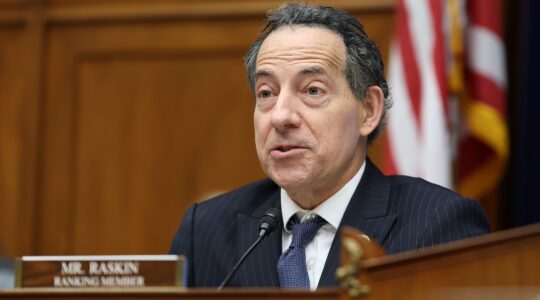WASHINGTON (JTA) — They were two Jewish aides who had offices within shouting distance of the Oval Office.
But the resignation last week of Rahm Emanuel as White House chief of staff and the imminent departure of David Axelrod, the president’s senior adviser, is raising the question of what the disappearance of the president’s top two Jewish aides will mean for the Jewish community.
Top Jewish Democrats and leaders of Jewish organizations say there will be an absence — of optics, not substance.
“It’s not every day that a White House chief of staff has his kid’s bar mitzvah in a Conservative shul and takes the family to Israel,” said Matt Dorf, the managing partner at Rabinowitz-Dorf, a communications firm that represents liberal and Jewish groups.
“That gave a human face to this White House to many in the Jewish community,” Dorf said. “In terms of policy and the Jewish community’s relationship with the White House, I don’t expect any change in that relationship.”
The visuals are not unimportant, a top Jewish aide to a senior congressman told JTA.
“People like to have someone who looks like them near power,” said the official, who spoke on condition of anonymity. “You say ‘Shanah Tovah,’ their faces light up.”
Nathan Diament, who directs the Washington office of the Orthodox Union, said that even the visuals wouldn’t suffer.
He noted that Jack Lew, an Orthodox Jew who likes to regale audiences with tales of the difficulties of reconciling observance with the 24/7 schedule of senior public service, is set to take over the Office of Management and Budget. The OMB director — essentially the administration’s numbers cruncher — is a Cabinet-level position, one Lew also held toward the end of the Clinton administration. He is leaving his position as deputy secretary of state to take the job.
“If you’re measuring Jewish prominence, there will be prominent Jews in the administration,” Diament said.
With Emanuel now in Chicago running for mayor and Axelrod set to leave early next year to run Obama’s re-election campaign, access won’t otherwise change, Jewish organizational officials across the board said.
“Axelrod’s roll for being a key conduit for taking advice from Jewish leaders will presumably continue when he has a political hat, not a government hat,” said William Daroff, who directs the Washington office of the Jewish Federations of North America.
Additionally, Obama’s official liaison to the community, Susan Sher, is still on the job — as chief of staff to Michelle Obama, the first lady, she occupies a fairly senior post.
Emanuel’s replacement, Peter Rouse, is seasoned at dealing with constituencies, including among the pro-Israel and Jewish communities, having worked as chief of staff to Obama when he was in the U.S. Senate and previously for Tom Daschle, the former Senate majority leader.
“It’s more important that that person have a positive disposition to issues of concern in the Jewish community than be Jewish,” said Rabbi Levi Shemtov, who directs American Friends of Lubavitch.
Privately, Jewish officials said Emanuel’s departure potentially could smooth relations between Obama and the Jewish community for two reasons: Emanuel had earned a reputation in Israel as anti-Israel, and his overall style had alienated core constituencies, among them the Jews.
One Jewish organizational official said Emanuel’s brusque “just listen to me” style had severely hampered Obama’s agenda, leading not only to tensions with the pro-Israel community but with gays, liberals and groups seeking health care reform.
“Part of the reason he got into the trouble he got into were relationship issues,” the official said.
Additionally, Emanuel’s departure means that on Israel policy, Obama no longer will be able to say, as he did in an infamous meeting with Jewish leadership in the summer of 2009, that he has Emanuel to check his policies and does not need to consult with the wider community.
It was a blinkered “If Rahm and Axe are Jewish and they think this is OK, it’s OK” policy, is how the Jewish organizational official put it.
The problem with that view, some Jewish observers said, is that White House staffers — even at that senior level — are likely to defer to the boss, whereas Jewish leaders would be blunter in their assessments. But with two Jewish staffers, Obama mistakenly thought he didn’t need to consult with the Jews, these observers said. They blamed that insularity in part for tensions over West Bank settlement building that dogged the first year of the Obama-Netanyahu relationship.
Despite those troubles, some Jewish organizational leaders were baffled by a view prevalent in the Netanyahu government that Emanuel somehow had guided Obama down a path that was hostile to Netanyahu.
Emanuel, in fact, had little to nothing to do with formulating Middle East policy, although he did take a role in selling it — most recently when he met with Netanyahu over the summer on his son’s bar mitzvah trip.
Furthermore, the two individuals now running the policy in the White House — National Security Council staffers Daniel Shapiro and Dennis Ross — are sensitive to Jewish concerns.
“Rahm was not running Middle East policy,” Diament said. “Dennis Ross and Dan Shapiro are still there.”

Help ensure Jewish news remains accessible to all. Your donation to the Jewish Telegraphic Agency powers the trusted journalism that has connected Jewish communities worldwide for more than 100 years. With your help, JTA can continue to deliver vital news and insights. Donate today.





